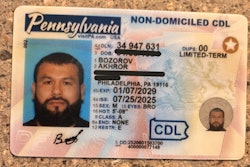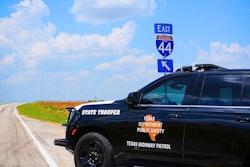The U.S. Department of Transportation’s most aggressive regulatory action in years, an emergency final rule looking to purge 200,000 non-domiciled CDL holders from truck driving, has lost its first battle in court, but does that really matter?
Across President Donald Trump’s entire administration, no agency makes a secret of its desire to see non-citizens expelled. In the trucking context, the administration's DOT and the Federal Motor Carrier Safety Administration want trucking made “great again” under one common language, English, while putting American drivers first.
Following the court’s pause of the FMCSA’s September 29 emergency rulemaking, Overdrive reporting showed that among all 11 states consulted, none had re-started non-domiciled CDL issuance yet. California and Pennsylvania, two of the country’s biggest issuers of non-domiciled CDLs, have been put under special orders to halt and reform their non-domiciled programs, and that order hasn’t been brought before a court yet.
"We won’t stop fighting to keep dangerous, unqualified truck drivers off the road," DOT Secretary Duffy said in response to the court ruling.
Even though on paper it’s dead in the water for now, DOT’s non-domiciled crackdown lives on in practice.

Even if states turn the CDL printers back on tomorrow for non-citizens, this administration has already shown its fangs, and it’s clearly meant to show non-domiciled drivers they’re not welcome hauling on U.S. interstates.
Duffy said that Trump told the cabinet secretaries to work together, and perhaps there are no two secretaries working more closely together than Duffy and Department of Homeland Security’s Kristi Noem. Sometimes it's hard to read the tea leaves in politics. Other times, the writing is on the wall.
Sometimes it's hard to read the tea leaves in politics. Other times, the writing is on the wall.
Under Noem, DHS has amped up its 287(g) program to deputize state and local law enforcement to do immigration work, including detentions and deportations. Already, these DHS and state partnerships have netted hundreds of arrests of what official communications dub “illegal alien” drivers around the country, even one “wanted terrorist” driver in Kansas.
While California Governor Gavin Newsom might want to stand up to Duffy and the Trump administration, there’s only so much one state governor can do. From the Dakotas to Texas, Trump won every state down the middle of a country where freight, generally, moves east to west.
Nevada, for example, took the "proactive, responsible approach" and just completely shut down non-domiciled CDL issuance altogether.
 The 2024 electoral map. Chessrat at Wikimedia Commons
The 2024 electoral map. Chessrat at Wikimedia Commons
Immigration and Customs Enforcement raids along freight corridors in Indiana, Oklahoma, Texas, Florida and Louisiana show that states with the appetite are taking aggressive action against non-citizen drivers.
Duffy furthermore said DOT would “go after” shippers and carriers that hire non-citizen or non-English-speaking drivers.
[Related: DOT vows 'serious consequences' for CDL mills and carriers, shippers hiring 'illegal alien' drivers]
What crime would a shipper who loads a non-English speaking driver have committed? What about loading a non-domiciled CDL holder? These CDLs, for the most part, remain valid unless past their expiration date.
Dale Prax, longtime freight fraud vigilante and FMCSA’s “worst critic,” said DOT might hit carriers with violations of 49 CFR §390.11, “using or permitting an unqualified driver,” which could come with civil penalties.
But FMCSA historically doesn’t even enforce its own civil penalties for things like perjury or fraud.
[Related: FMCSA's confusing excuse for not enforcing its own rules]
DOT did not respond to Overdrive queries about how it might “go after” shippers and carriers, but in any case it does matter that this DOT feels comfortable making blanket threats. When Duffy announced the emergency rule seeking to end non-domiciled CDL issuance, he said the rule wasn’t retroactive not because he didn’t want to immediately rip up every single non-domiciled CDL in existence, but because he couldn’t find a way to legally get that done.
“If we can find a pathway forward to make it retroactive, we will because we're very concerned,” he said.
Even when it seems like the Trump administration might allow some special case-by-case CDLs for non-citizens, like the three classes of business visas allowed under the DOT’s emergency rule, don’t count on it.
DOT’s rulemaking said it intended to remove 194,000 non-domiciled CDLs from circulation out of a total 200,000, with the remaining 6,000 belonging to visa holders -- but the State Department in August paused all issuance of visas for truck driving work.
Duffy also promises to do more. Planned actions on ELD tampering and “CDL mills,” issues firmly under the aegis of DOT and perhaps not as likely to attract legal challenges, could further shake trucking up.
Court order or not, the business world has taken notice of the government's concerns about non-domiciled CDLs. Gregory Reed, a partner at law firm Hanson Bridgett, warned that non-citizen drivers now represent a nuclear verdict waiting to happen. Overdrive has spoken to insurers, too, who are starting to ask about the citizenship status of drivers at the carriers they cover.
Overdrive caught up with Reed to get a legal read on the court’s action, as well as DOT’s paths forward. Reed thought not only would DOT eventually win in litigation, where the case could be judged on its merits, but that the larger immigration crackdown would proceed at pace.
“While I believe that the DOT will ultimately be successful in implementing the interim final rule, a significant component of the court’s opposition to the rule in granting the stay of enforcement was procedural or a product of the speed with which Secretary Duffy moved,” said Reed. “Although it would come with significant delay, it is likely that the DOT could implement a substantively equivalent regulation through the standard rulemaking process.”
But even if the DOT loses in court and drops its rulemaking effort entirely, “stricter enforcement of existing requirements for obtaining a CDL will further the same objectives," said Reed, referring to DOT and DHS's other tools for putting bad carriers out of service or maybe even out of the country.
[Related: The terrorism threat and trucking: Who is vetting 'wanted terrorist' CDL drivers?]









